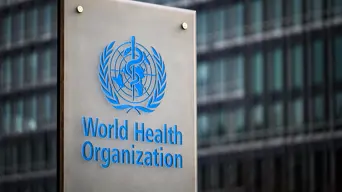WHO issues unprecedented global guidelines to combat infertility
AFP
28 November 2025 | 8:40‘One in six people worldwide experience infertility during their lifetime,’ said Pascale Allotey, the global health body's head of sexual and reproductive health.

This photograph taken on 7 December 2021 shows a sign of the World Health Organisation (WHO) at their headquarters in Geneva. Argentina will pull out of the World Health Organization, a presidential spokesman said on February 5, following in the footsteps of the United States which announced its exit from the UN agency last month. Picture: Fabrice COFFRINI / AFP.
GENEVA - The World Health Organization on Friday published for the first time directives to improve the prevention, detection and treatment of infertility, which affects millions across the globe.
"One in six people worldwide experience infertility during their lifetime," said Pascale Allotey, the global health body's head of sexual and reproductive health.
"The condition affects individuals and couples across all regions and income levels.
"And yet access to safe and affordable care remains highly inequitable."
Allotey told reporters that the issue of infertility had been neglected "for far too long".
The new guide would provide a "unified, evidence-based foundation" to ensure care is safe, effective and accessible for all, she added.
According to the WHO, infertility is a condition of the male and female reproductive system, defined as the inability to achieve pregnancy after 12 months or more of regular unprotected sexual relations.
The situation can lead to major distress, stigmatisation and financial difficulties.
In several countries, most of the cost of infertility tests and treatment is borne by patients, which often leads to "catastrophic financial expenditures".
"In some settings, even a single round of in vitro fertilisation (IVF) can cost double the average annual household income," the WHO said.
The guide, published on Friday, sets out 40 recommendations and calls for the integration of fertility in national health funding, services and strategies.
It also wants to see steps for effective clinical management, in both diagnosis and treatment.
For example, the WHO calls for male diagnoses, which are often under-investigated, suggesting a range of approaches, starting with advice before moving to active treatment.
It also advises increased investment in prevention.
Health professionals need to address the main risk factors for infertility, which include untreated sexually transmitted infections and smoking, it says.
Get the whole picture 💡
Take a look at the topic timeline for all related articles.
















